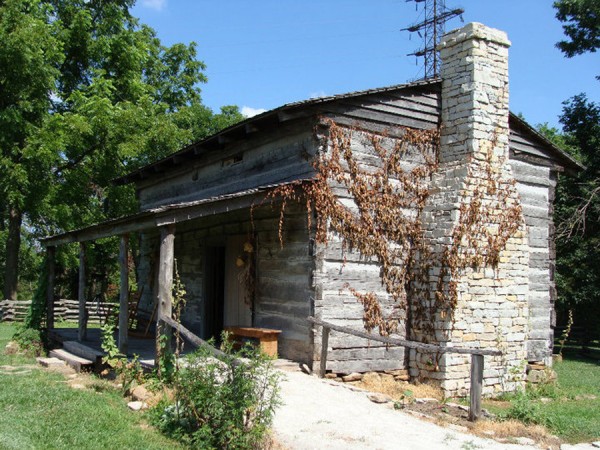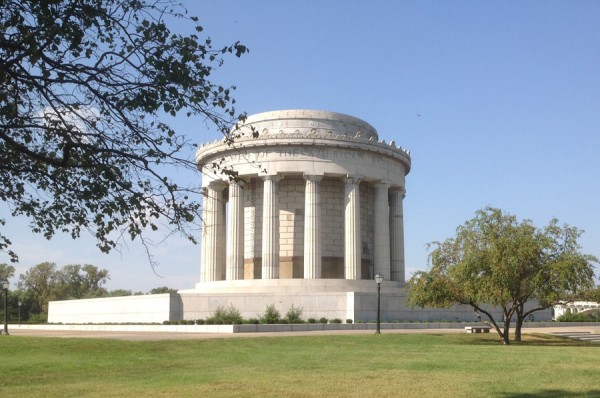‘Indiana at 200’ — George Rogers Clark, Indiana’s Hero
 EDITORS NOTE: This is the start of a series of essays leading up to the celebration of the Indiana Bicentennial In December 2016. The essays focus on the top 100 events, ideas and historical figures of Indiana, in chronological order, tying each to a place or current event in Indiana that continues to tell the story of the state.
EDITORS NOTE: This is the start of a series of essays leading up to the celebration of the Indiana Bicentennial In December 2016. The essays focus on the top 100 events, ideas and historical figures of Indiana, in chronological order, tying each to a place or current event in Indiana that continues to tell the story of the state.
By ANDREA NEAL
If not for George Rogers Clark, we Hoosiers might be snacking on scones with jam and clotted cream and speak with cockney accents.
An exaggeration perhaps, but as Kelley Morgan points out, “George Rogers Clark was almost singlehandedly responsible for the U.S. gaining the Old Northwest Territory.”
Morgan is interpretive manager at Falls of the Ohio State Park in Clarksville, where a representation of Clark’s retirement home overlooks the falls with stunning views of the Ohio River.
 A native of Tennessee, Morgan was unfamiliar with Clark until coming to Indiana and she laments that so few Americans know his story. “I think George ended up being overshadowed by his younger brother William” of Lewis and Clark fame.
A native of Tennessee, Morgan was unfamiliar with Clark until coming to Indiana and she laments that so few Americans know his story. “I think George ended up being overshadowed by his younger brother William” of Lewis and Clark fame.
George Clark was born in 1752 in Virginia and was a lifelong friend of President Thomas Jefferson, with whom he shared passions for science, zoology and the culture of Native Americans.
At age 20, Clark went west on a surveying trip and claimed land for himself and friends in what would become Kentucky. Life was tense there because of constant warfare with Native Americans and British laws against westward settlement. In June 1776, his fellow citizens asked Clark to lobby the state of Virginia for military assistance and stronger political ties.
The charismatic redhead proved persuasive. Virginia, though preoccupied with the coming war for independence, granted Kentucky status as a county and supplied 500 pounds of gunpowder.
By 1777, Clark realized that the British were inciting Native American harassment of settlers, including paying bounties for prisoners and scalps. The Virginia legislature granted Clark a commission as lieutenant colonel and permission to gather troops.
Clark set his sights on capturing British forts in the Old Northwest, the territory that would become Ohio, Indiana, Illinois, Michigan and Wisconsin.

George Rogers Clark’s original two-room cabin was destroyed in 1854. This representation overlooks the Ohio River at Falls of the Ohio State Park.
Virginia Gov. Patrick Henry authorized Clark to attack the British fort of Kaskaskia (Illinois) in French-occupied territory on the Mississippi River. Clark set up a supply base at the Falls of the Ohio. Clark and his men surprised Kaskaskia on July 4, 1778, taking the fort and town without firing a shot. In the coming months, Clark rallied support from the French while planning another bold move against the British at Fort Sackville in Vincennes.
“On Feb. 23, they surprised Vincennes,” according to the Indiana Historical Bureau account. “Clark ordered that all of the company’s flags be marched back and forth behind a slight rise to convince the British that there were 600 men rather than under 200. They opened fire on the fort with such accuracy that the British were prevented from opening their gun ports.”
On Feb. 25, British officer Henry Hamilton surrendered. The British never regained control and “American claims in the Old Northwest served as the basis of the cession of these lands to the United States at the Treaty of Paris in 1783.”
Clark spent much of his personal fortune on the war effort and was never repaid; he died in poverty and obscurity. His heroism is appropriately remembered at Clarksville and at Vincennes, where the National Park Service operates a memorial in his honor.
Directions to George Rogers Clark National Historical Site: 401 S. Second St., Vincennes. From I-70, go south on US 41 and follow the signs.
Directions to Falls of the Ohio State Park: (Street address is 201 West Riverside Dr., Clarksville.) Take Exit 0 on I-65 and follow the signs.
Andrea Neal is a teacher at St. Richard’s Episcopal School in Indianapolis and adjunct scholar with the Indiana Policy Review Foundation. She has written extensively about taxes, good governance, higher education, civic education and K-12 reform. Contact her at [email protected].
Indiana Policy Review Foundation is a non-profit education foundation focused on state and municipal issues.

